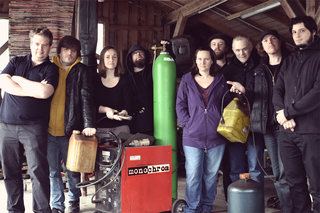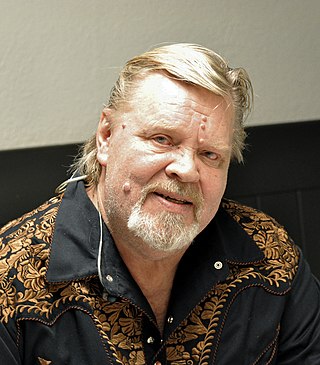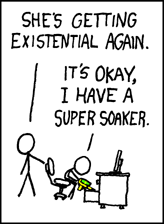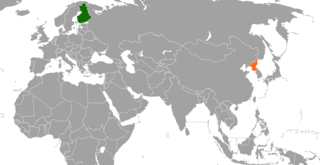
Finland, officially the Republic of Finland, is a Nordic country in Northern Europe. It borders Sweden to the northwest, Norway to the north, and Russia to the east, with the Gulf of Bothnia to the west and the Gulf of Finland to the south, opposite Estonia. Finland covers a total area of 338,145 square kilometres (130,559 sq mi), including a land area of 303,815 square kilometres (117,304 sq mi), and has a population of 5.6 million. Helsinki is the capital and largest city. The vast majority of the population are ethnic Finns. The official languages are Finnish and Swedish; 84.9 percent of the population speak the first as their mother tongue and 5.1 percent the latter. Finland's climate varies from humid continental in the south to boreal in the north. The land cover is predominantly boreal forest biome, with more than 180,000 recorded lakes.

Neil Richard MacKinnon Gaiman is an English author of short fiction, novels, comic books, graphic novels, audio theatre, and screenplays. His works include the comic book series The Sandman and the novels Good Omens, Stardust, Anansi Boys, American Gods, Coraline, and The Graveyard Book. He co-created the TV series adaptations of Good Omens and The Sandman.

Urho Kaleva Kekkonen, often referred to by his initials UKK, was a Finnish politician who served as the eighth and longest-serving president of Finland from 1956 to 1982. He also served as prime minister, and held various other cabinet positions. He was the third and most recent president from the Agrarian League/Centre Party. Head of state for nearly 26 years, he dominated Finnish politics for 31 years overall. Holding a large amount of power, he won his later elections with little opposition and has often been classified as an autocrat.

Tampere is a city in Finland and the regional capital of Pirkanmaa. It is located in the Finnish Lakeland. The population of Tampere is approximately 260,000, while the metropolitan area has a population of approximately 423,000. It is the 3rd most populous municipality in Finland, and the second most populous urban area in the country after the Helsinki metropolitan area.

The 1952 Summer Olympics, officially known as the Games of the XV Olympiad and commonly known as Helsinki 1952, were an international multi-sport event held from 19 July to 3 August 1952 in Helsinki, Finland.

Matti Taneli Vanhanen is a Finnish politician who served as Prime Minister of Finland from 2003 to 2010. He was also Chairman of the Centre Party in 2006. In his earlier career, he was a journalist. Vanhanen is the son of professor Tatu Vanhanen and Anni Tiihonen.

The Finns Party, formerly known as the True Finns, is a right-wing populist political party in Finland. It was founded in 1995 following the dissolution of the Finnish Rural Party.

Kajaani, historically known as Cajanaburg, is a town in Finland and the regional capital of Kainuu. Kajaani is located southeast of Lake Oulu, which drains into the Gulf of Bothnia through the Oulu River. The population of Kajaani is approximately 37,000, while the sub-region has a population of approximately 51,000. It is the 32nd most populous municipality in Finland.

Monochrom is an international art-technology-philosophy group, publishing house and film production company. It was founded in 1993, and defines itself as "an unpeculiar mixture of proto-aesthetic fringe work, pop attitude, subcultural science and political activism". Its main office is located at Museumsquartier/Vienna.

Public baths originated when most people in population centers did not have access to private bathing facilities. Though termed "public", they have often been restricted according to gender, religious affiliation, personal membership, and other criteria.

Vesa-Matti "Vesku" Loiri was a Finnish actor, musician and comedian, best known for his role as Uuno Turhapuro, whom he portrayed in a total of 20 movies between the years 1973 and 2004.

xkcd, sometimes styled XKCD, is a serial webcomic created in 2005 by American author Randall Munroe. The comic's tagline describes it as "a webcomic of romance, sarcasm, math, and language". Munroe states on the comic's website that the name of the comic is not an initialism but "just a word with no phonetic pronunciation".

Mass surveillance in the People's Republic of China (PRC) is the network of monitoring systems used by the Chinese central government to monitor Chinese citizens. It is primarily conducted through the government, although corporate surveillance in connection with the Chinese government has been reported to occur. China monitors its citizens through Internet surveillance, camera surveillance, and through other digital technologies. It has become increasingly widespread and grown in sophistication under General Secretary of the Chinese Communist Party (CCP) Xi Jinping's administration.

In internet governance, network sovereignty, also called digital sovereignty or cyber sovereignty, is the effort of a governing entity, such as a state, to create boundaries on a network and then exert a form of control, often in the form of law enforcement over such boundaries.
Venmo is an American mobile payment service founded in 2009 and owned by PayPal since 2013. Venmo is aimed at users who wish to split their bills. Account holders can transfer funds to others via a mobile phone app; both the sender and receiver must live in the United States. Venmo also operates as a small social network, as users can observe other users' public transactions with posts and emoticons. In 2021, the company handled $230 billion in transactions and generated $850 million in revenue. Users can view transactions on the Venmo website but cannot complete transactions on the website.
Google's changes to its privacy policy on March 16, 2012, enabled the company to share data across a wide variety of services. These embedded services include millions of third-party websites that use AdSense and Analytics. The policy was widely criticized for creating an environment that discourages Internet innovation by making Internet users more fearful and wary of what they do online.
Surveillance capitalism is a concept in political economics which denotes the widespread collection and commodification of personal data by corporations. This phenomenon is distinct from government surveillance, although the two can be mutually reinforcing. The concept of surveillance capitalism, as described by Shoshana Zuboff, is driven by a profit-making incentive, and arose as advertising companies, led by Google's AdWords, saw the possibilities of using personal data to target consumers more precisely.

Finland–North Korea relations are bilateral relations between Finland and North Korea.

In Finland, the far right was strongest in 1920–1940 when the Academic Karelia Society, Lapua Movement, Patriotic People's Movement (IKL) and Vientirauha operated in the country and had hundreds of thousands of members. In addition to these dominant far-right and fascist organizations, smaller Nazi parties operated as well.

Canal Cheong Jagerroos is a Chinese contemporary artist. Brought up in an artistic family in Macau, Cheong Jagerroos works primarily in abstract painting and installations. Her works have been exhibited worldwide since the 1980s. While Cheong Jagerroos is best known for her more traditional multi-layered rice-paper abstract paintings, her later works are based on conceptual art. Her art is infused with ancient metaphoric symbols, signs, and contemporary expressions.


















